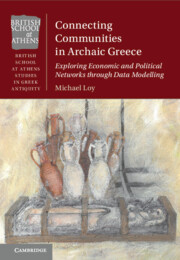 Connecting Communities in Archaic Greece
Connecting Communities in Archaic Greece Book contents
- Connecting Communities in Archaic Greece
- British School at Athens Studies in Greek Antiquity
- Connecting Communities in Archaic Greece
- Copyright page
- Contents
- Figures
- Tables
- Acknowledgements
- Abbreviations
- 1 Introduction
- 2 Economic Networks
- 3 Economic Networks
- 4 Entangled Networks
- 5 Political Networks
- 6 Political Networks
- 7 Conclusions
- Bibliography
- Index
3 - Economic Networks
Commodities and Semi-Luxuries
Published online by Cambridge University Press: 13 July 2023
- Connecting Communities in Archaic Greece
- British School at Athens Studies in Greek Antiquity
- Connecting Communities in Archaic Greece
- Copyright page
- Contents
- Figures
- Tables
- Acknowledgements
- Abbreviations
- 1 Introduction
- 2 Economic Networks
- 3 Economic Networks
- 4 Entangled Networks
- 5 Political Networks
- 6 Political Networks
- 7 Conclusions
- Bibliography
- Index
Summary
This chapter builds on the discussion of product shipping from the previous chapter, but by introducing a different sort of product: commodity or semi-luxury goods (in the words of Lin Foxhall), things transported in ceramic amphoras that were also loaded onto ships. The distribution of pottery from across various sanctuaries and urban sites is considered to make the point that certain sites ‘specialised’ in various products, and that there might be evidence for Greeks selecting certain products for import or export. This element of choice is indicative of a wide amount of economic knowledge circulating in the Greek world that is not immediately materially visible. Spatial network modelling is conducted for this dataset too, revealing similar shapes to those from the previous chapter, and making the case for possible ‘piggy-backing’ of goods shipped from similar production sites to points of consumption.
Information
- Type
- Chapter
- Information
- Connecting Communities in Archaic GreeceExploring Economic and Political Networks through Data Modelling, pp. 88 - 144Publisher: Cambridge University PressPrint publication year: 2023